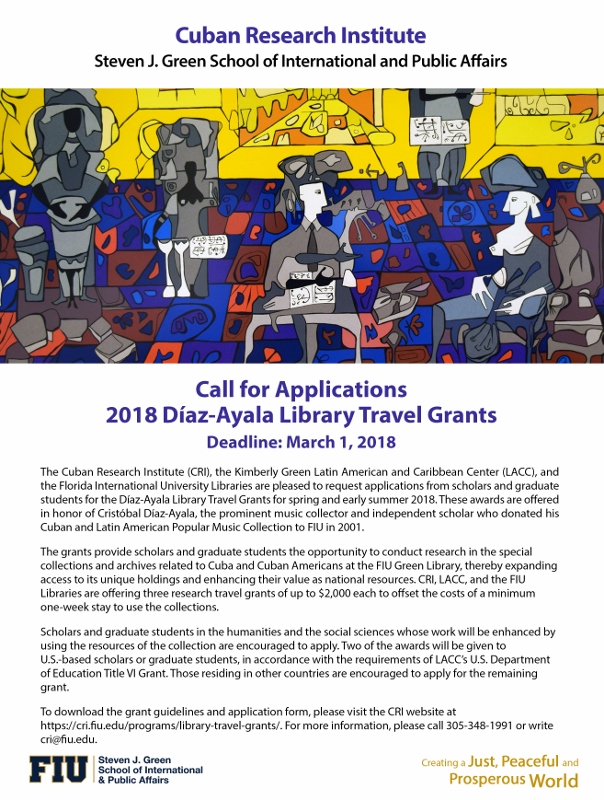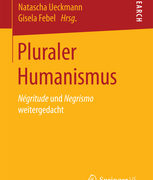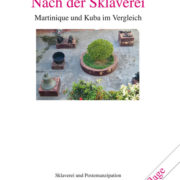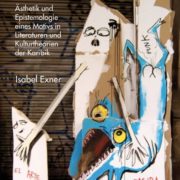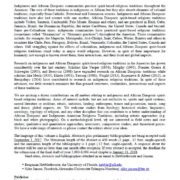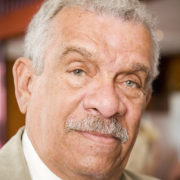New publication by Natascha Ueckmann
Pluraler Humanismus – Négritude und Negrismo weitergedacht
New arrival of Ulrike Schmieder
You may find further information here.
Call for Papers “Rethinking Europe from the Caribbean: Entanglements and Legacies” 12-15 April, 2018 Albert-Ludwigs-University of Freiburg, Germany
Call for Papers
“Rethinking Europe from the Caribbean: Entanglements and Legacies”
12-15 April, 2018
Albert-Ludwigs-University of Freiburg, Germany
The multiple ties that bind the Caribbean and Europe are the main focus of the conference marking 30 years since the Society for Caribbean Research (Socare) was founded. The Caribbean was the first region to be colonized by European powers in the 16th century and the last one to be (incompletely) decolonized in the 20th century. It received more than one-third of all Africans trafficked in the European trade in enslaved people between the 16th and 19th centuries as well as significant numbers of indentured and contracted European laborers during much of the same period, followed by indentureship and contract labor from Asia. The region was devastated by the genocide of indigenous populations at the hands of European colonists and experienced some of the most intense economic exploitation among Europe’s colonies. After World War II, European states compensated for their domestic labor shortages by recruiting large numbers of workers from their Caribbean colonies. This also prompted changes in the citizenship policies that European colonial powers directed at these migrants.
Today, more than one-third of Europe’s remaining colonial possessions are located in the Caribbean, and the CARICOM Reparations Commission, established in 2013, states that it “finds European colonial rule as a persistent part of Caribbean life.”[1] Nevertheless, historiography, geography, as well as social, literary, and cultural theories tend to conceive of Europe and the Caribbean as separate, even antithetical regions. For social sciences focused on modern industrial societies, the Caribbean’s legacy of enslavement made it appear as paradigmatically backward, inefficient, and underdeveloped. As such, it constituted the opposite of the notion of the free, modern, and efficient wage-work which Europe claimed to have pioneered. Having been shaped by an influx of African, European and Asian populations, the Caribbean has come to represent racial and ethnic diversity par excellence, as also evidenced in Caribbean thinkers’ theorizations of transculturation, hybridity, and creolization. In contrast, Europe – following centuries of mass emigration, nation-building processes, expulsions, and waves of ethnic cleansing – stood for high levels of ethnic homogenization. The reversal of the migration pattern since the mid-20th century in the direction of Europe, among other regions, triggered large-scale debates on race on the continent and increasingly framed immigration as a threat to European societies. In the context of literary studies, the canonical status of European ‘national’ literatures still tends to be juxtaposed to ‘postcolonial’ Caribbean literary production. Notions of postcoloniality similarly focus mainly on the former colonies, while only recently debates across Europe have begun to address the question of Europe’s postcoloniality.
In the wake of the humanitarian crises following the most recent hurricanes and earthquakes in the Greater Caribbean, limited and discrepant disaster relief efforts have again raised questions about political and economic relations between Western powers and the Caribbean. Facing public health disasters and waves of out-migration, island economies are further challenged through current citizenship regimes, fragmented political accountability and exploitative economic arrangements, which highlight the ambivalent geopolitical status of many Caribbean territories vis-à-vis European and U.S.-American interests.
Against the backdrop of these and related aspects, the conference focuses on the legacies and continuities of European colonialism in the region and on transregional entanglements between the Caribbean and Europe. Examining languages, (post)colonial histories, socioeconomic trajectories, and aesthetic practices in the Caribbean in their relations to Europe also provides a basis for rethinking Europe from the Caribbean. The conference aims to challenge the hypervisibility of Western Europe by highlighting Caribbean entanglements with othered and racialized Southern and Eastern Europes, as well as through the frequently ‘forgotten Europes’ still claimed as overseas territories and regions in the Greater Caribbean. What can Caribbean perspectives contribute to a different and more nuanced understanding of Europe(s) today?
We invite contributions from different research fields including, but not limited to, literary and cultural studies, sociology, anthropology, linguistics, philosophy, history, geography, and political science. Inter- and transdisciplinary perspectives are particularly welcome, as are poster presentations of PhD projects. We welcome contributions in English, French or Spanish and encourage handouts or presentation material in one of the languages other than that of the oral presentation. Possible topics include:
- The Caribbean as a laboratory of European modernity
- The political economy of race and racialization of the Caribbean in Europe
- Migration flows linking Europe and the Caribbean
- Coloniality, incomplete decolonization, and European Caribbean territories today
- Capitalism and non-wage labor in Europe and the Caribbean: enslavement, second serfdom, indentureship, apprenticeship
- European economic interests in today’s Caribbean: e.g., resort tourism, tax havens, land ownership and free-trade zones
- European and Commonwealth citizenships in the Caribbean as well as Caribbean citizenships in Europe
- Climate change, humanitarian crises, and disaster relief in the context of geopolitical ambivalence and fragmented sovereignties in the Caribbean
- The Caribbean in European politics of memory: e.g., native genocide, enslavement, CARICOM’s call for reparations from European countries
- Rethinking Europe(s) through Caribbean notions of transculturation, hybridity, and creolization
- Aesthetic entanglements between the Caribbean and Eastern or Southern Europe in literature, film, or visual arts
- Linguistic practices, interrelations, and language policies
Proposals for papers or posters (please state your choice) should include the author’s name and affiliation, presentation title, an abstract of around 300 words, as well as a short paragraph with biographical information.
Please submit proposals via e-mail to both conveners by 15 November 2017
Manuela Boatcă: manuela.boatca@soziologie.uni-freiburg.de
Annika McPherson: annika.mcpherson@philhist.uni-augsburg.de
[1] http://caricomreparations.org/caricom/caricoms-10-point-reparation-plan/
Obituary Jean Bernabé
Jean Bernabé, the renowned Martinican linguist and writer, passed away on April, 12 2017 after a prolonged illness.
Bernabé was one of the most important figures in the domain of Creole Studies and therefore leaves a large gap within research communities of the whole world.
The professor emeritus of the University of the French West Indies was the founder of the GEREC (Groupe d’études et de recherches en espace créolophone, afterwards Groupe d’études et de recherches en espace créole et francophone (GEREC-F) and today Centre de Recherches Interdisciplinaires en Lettres, Langues, Arts et Sciences Humaines (CRILLASH)), which is an important international und transdisciplinary research group dedicating their work to the creole language and culture in the area of Martinique, Guadeloupe and French Guiana. It is thanks to Jean Bernabé that the University has opened its doors for a bachelor and a master in Creole. One further achievement of the GEREC was the establishment of the CAPES de créole, a pedagogical certificate that allows high school teachers to teach Creole.
However, his work is not restricted to linguistics. Through the influential publication of the Éologe de la Créolité with his colleagues and friends Patrick Chamoiseau and Raphaël Confiant, Bernabé marked the concept of a Creole identity and culture significantly. Until his last publication La Dérive identitariste (2016), he worked on possible approaches to come to terms with the complex colonial past.
Jean Bernabé was regarded as an eloquent and determined person who was always acting in the interest of the community. He leaves a wife, two children, and three grandchildren. From October 25th to 27th, 2017, the CRILLASH (Université des Antilles) is holding the international colloquium Tracées de Jean Bernabé on his behalf.
Find enclosed further links concerning his life and work:
http://www.montraykreyol.org/article/loeuvre-du-pr-jean-bernabe-au-sein-de-notre-universite http://montraykreyol.org/article/creolistique-jean-bernabe-ou-le-choix-dune-vie-1e-partie http://www.montraykreyol.org/article/creolistique-jean-bernabe-ou-le-choix-dune-vie-2e-partie http://www.montraykreyol.org/article/creolistique-jean-bernabe-ou-le-choix-dune-vie-3e-partie
CfP: African Diasporic and Indigenous American Religious Traditions: Continuities, Intersections and Global Impact
Indigenous and African Diasporic communities practice spirit-based religious traditions throughout the Americas. The core of these traditions is indigenous or African but they also absorb elements of colonial traditions, especially from Catholic, Protestant and Freemason sources. Indigenous and African Diasporic traditions have also had contact with one another. African Diasporic spirit-based religious traditions include Vodou, Santería, Candomblé, Palo Monte, Kumina and others, and are practiced in Haiti, Cuba, Jamaica, Brazil, the Dominican Republic, the entire Caribbean, the United States, Canada and beyond. Since pre-Columbian times, indigenous communities have practiced spirit-based religious traditions (sometimes called “Shamanism” or “Shamanic practices”) throughout the Americas. Those communities include, for example, the Mapuche, Matsigenka, Avá-Chiripá, Inuit, Cubeo, Warao, Baniwa and others in countries like Chile, Peru, Paraguay, Bolivia, Brazil, Venezuela, Colombia, the United States, Canada and others. Still struggling against the effects of colonialism, indigenous and African Diaspora spirit-based religious traditions stand today as major world religions. However, in spite of their importance for humanity, not enough is known about them, their interactions, and their local and global impacts.
The language of this volume is English. Abstracts plus preliminary bibliographies are being accepted until September 1, 2017. The Maximum length of the abstract is 450 words (1 page, .12 font, single-spaced) and the maximum length of the bibliography is 1 page (.12 font, single-spaced). A response about the abstract will be sent no later than one month after reception. If your abstract is accepted, the deadline for the submission of the final draft of your 5,000-8,000-word chapter is January 31, 2018.
Send ideas, abstracts and bibliographies attached in an email to Hebblethwaite and Jansen:
- Benjamin Hebblethwaite, the University of Florida, hebble@ufl.edu
- Silke Jansen, Friedrich-Alexander-Universität Erlangen-Nürnberg, silke.jansen@fau.de
Full CfP: CFP African Diasporic and Indigenous American Religious Traditions
New Open Access Academic Journal for Caribbean Studies
New Open Access Academic Journal for Caribbean Studies
Karib: Nordic Journal for Caribbean Studies (ISSN 2387-6743) is a peer-reviewed open-access journal for research articles. The focus is on literature and literary theory, but we welcome articles with a cross-disciplinary approach seeking to engage in dialogue with various fields, notably history, anthropology, art, aesthetics, performance studies, cultural studies, and history of ideas, in order to promote high quality research on contemporary and historical Caribbean topics.
Based at the Department of Languages at Uppsala University and published with Stockholm University Press, the journal accepts articles in the region’s three major languages: English, Spanish, and French./Karib/is published online as a continuous volume and issue throughout the year, thus insuring a swift publication process. Articles are submitted on-line and are made available as soon as they are accepted by the Editorial Committee.
We invite researchers and doctoral students to submit articles on any topic corresponding to the journal’s area of interest. But we also issue calls for papers on specific topics which will be published in a special section on Karib’s website. For this year, we are opening a special call for articles: “Curating the Caribbean: Museum Practice, History and Identity Formation”.
For further information, please read our latest editorial at www.karib.no and do not hesitate to spread the word to colleagues and students.
Christina Kullberg (Uppsala University) and Hans Jacob Ohldieck (University of Bergen), editors.
Obituary Derek Walcott (1930-2017)
The Caribbean poet, essayist, painter and Nobel laureate Derek Walcott has passed away. Walcott, who was born in 1930 in St. Lucia and died there on March 17th, 2017, is the author of countless collections of poetry, pieces of theater and of the epic poems Omeros and Tiepolo’ Hound, which present reflections on the culture(s) of the Caribbean and on his exile in Great Britain and in the United States of America.
In his essay “The muse of history” (1974) he writes: “I give the strange and bitter and yet ennobling thanks for the monumental groaning and soldering of two great worlds, like the halves of a fruit seamed by its own bitter juice, that exiled from your own Edens you have placed me in the wonder of another, and that was my inheritance and your gift.“
Alongside Édouard Glissant, Paul Gilroy and Antonio Benítez Rojo, Walcott was one of the most read and extensively acclaimed Caribbean writers and thinkers of his generation.
https://jamaicagleaner.com/article/focus/20170319/ralph-thompson-derek-walcott-was-obsessed-death
http://www.trinidadexpress.com/20170317/news/sir-derek-walcott-has-died
https://guardian.co.tt/news/2017-03-18/pen-was-walcott%E2%80%99s-gift
http://www.newyorker.com/culture/culture-desk/derek-walcott-a-mighty-poet-has-died
http://www.zeit.de/politik/2017-03/derek-walcott-tod-literaturnobelpreistraeger-karibik?print
https://repeatingislands.com/2017/03/21/sir-derek-alton-walcott-to-receive-state-funeral/
https://repeatingislands.com/2017/03/18/derek-walcott-the-colonial-upstart-who-remade-the-world/
https://stluciatimes.com/2017/03/18/caricom-pays-tribute-sir-derek-walcott
(Picture under CC BY-SA 3.0 license, courtesy of the photographer Bert Nienhuis.)



